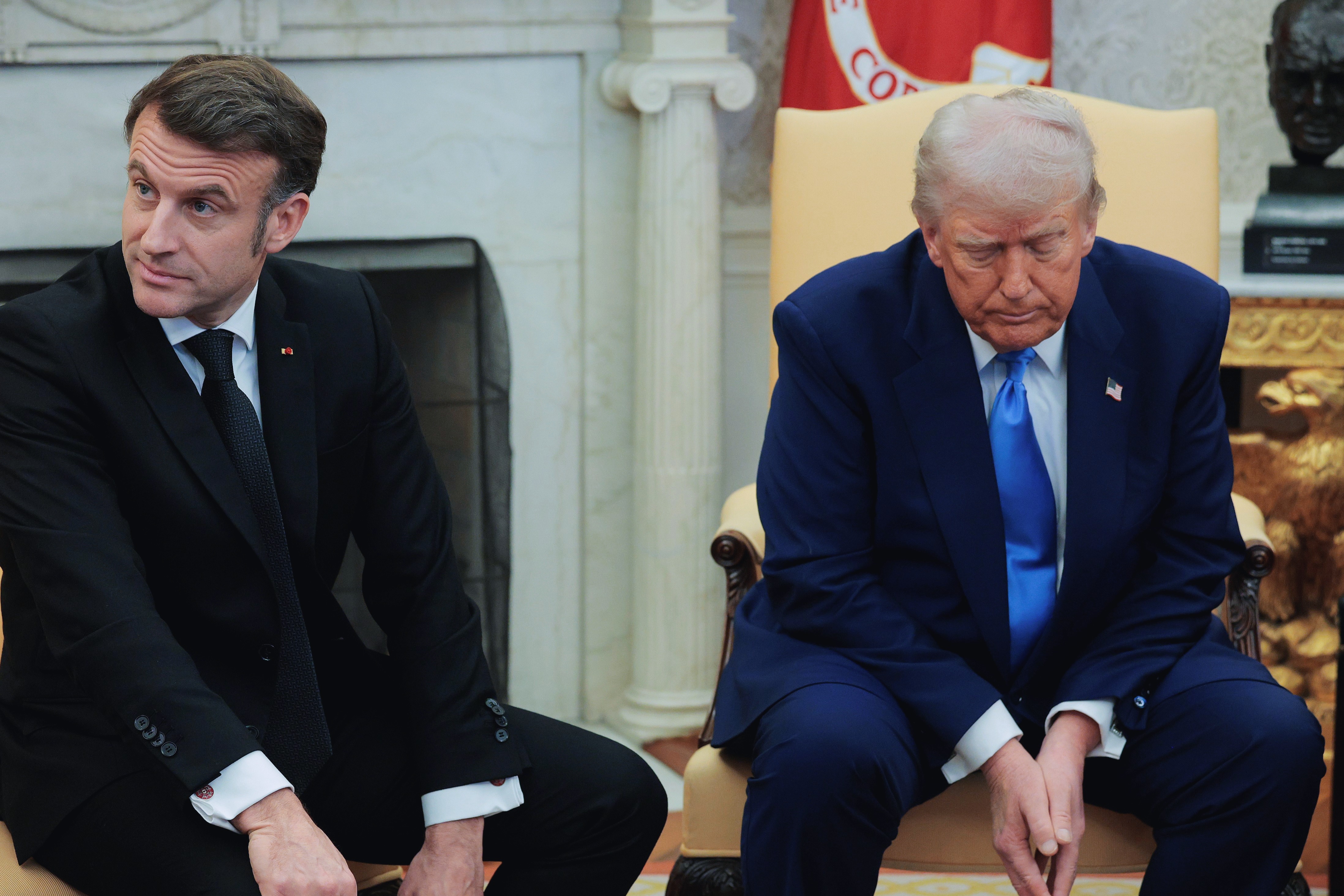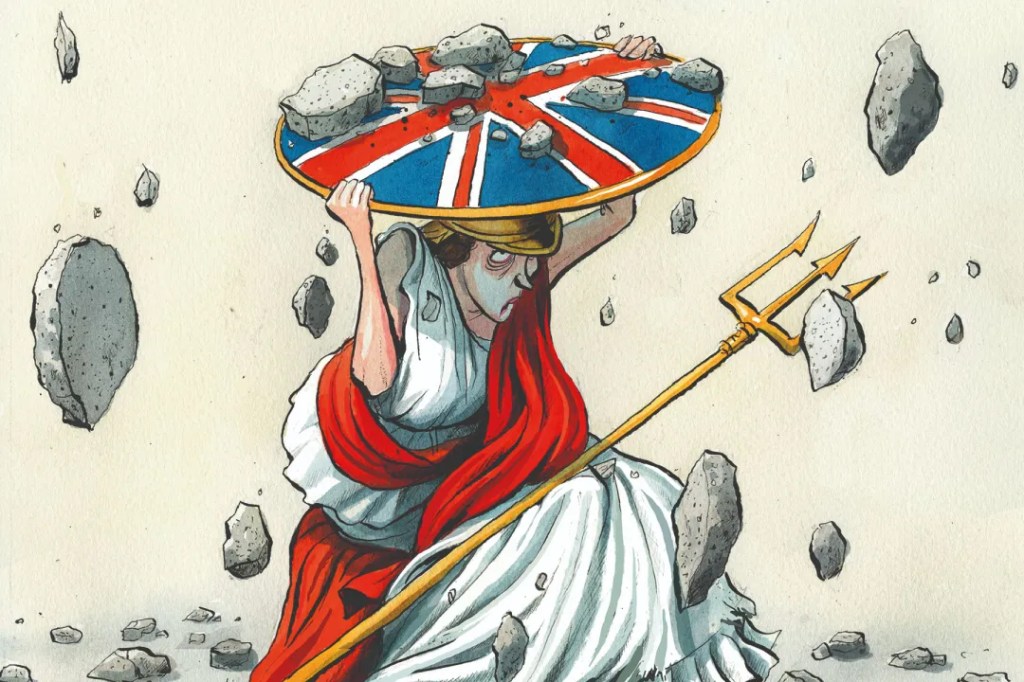Has there been a more cataclysmic year than 2025 for US-Europe relations? It started with US Vice President J.D. Vance’s ‘sermon’ to EU leaders at the Munich security conference last month – in which he berated Western Europe for its policies on immigration and free speech. The year so far has also taken in the danger of the Nato alliance falling apart after 76 years of peace in Western Europe, with the White House apparently tilting towards Russia and Trump demanding that members of the alliance such as Germany, France and the UK massively up their defence spending.
This week, as the Trump regime imposes tariffs on Europe and Europe responds in kind, we’ve even seen the rumblings of a fully-fledged trade war. Friedrich Merz, Germany’s likely next chancellor, says it’s ‘clear that the Americans… this administration, are largely indifferent to the fate of Europe’. Meanwhile, French President Emmanuel Emmanuel Macron announced, in an address to the French nation last week, that ‘the innocence of the last thirty years, since the fall of the Berlin Wall, is now over’.
Merkel is yesterday’s news. Trump is today’s
No one should be in the least surprised. As early as 1990, in a notorious interview with Playboy magazine, Donald Trump railed against German cars and complained about ‘being ripped off so badly by our so-called allies’. In Michael Wolff’s Siege: Trump under Fire, the President is described as long having wished ‘to undermine Nato’:
Trump wanted to undermine Europe as a whole. In his mind, if not also in some covert understanding, Trump had realigned the power axis from Europe to Russia, and was now, in Russia’s interest if not at its behest, trying to weaken Europe.
The book was published in 2019.
It was German Chancellor Angela Merkel, the self-styled ‘Queen of Europe’, with whom Trump clashed in his previous term most visibly. Even before it, when in 2015 Time magazine named her Person of the Year, Trump howled in a tweet they had ‘picked [the] person who is ruining Germany’. As US elections approached in 2016, Germany’s press responded in kind, an article in Der Spiegel announcing Trump to be ‘the leader of a new, hate-filled authoritarian movement’. They added that ‘nothing would be more harmful to the idea of the West and world peace than if he were to be elected president’. French newspaper Liberation put it differently: ‘Trump,’ said the headline, ‘From nightmare to reality’.
It was a reality that Merkel soon had to deal with. From the outset, the chemistry between the two leaders seemed not so much absent as corrosive. Of her initial meeting with Trump in 2017, Merkel recalled that they ‘spoke on two different levels. Trump on an emotional level, me on a factual one… When he paid attention to my arguments, it was usually only in order to construct new accusations from them.’ Trump rebuffed a handshake from Merkel before the world’s press and, after the pack of journalists had departed, reportedly turned on her: ‘Angela,’ he’s alleged to have said, ‘You owe me one trillion dollars.’
Germany’s low contribution to Nato – about 1.25 per cent of GDP – had been an obsession of Trump’s for some time. While membership of the Atlantic alliance required each member to spend 2 per cent of GDP on defence, only four European countries at the time – Estonia, Latvia, the UK and Greece – did so.
Nor was Trump’s exasperation anything new: Obama had voiced his own frustrations in 2014. One ‘senior German official’ later admitting to journalist Susan B. Glasser that ‘Not all of what [Trump] says is wrong… Europe has been free-riding for some time.’ It was more a matter with the open contempt and combativeness with which it was expressed.
When she left the meeting and flew back to Germany, Merkel said, ‘I didn’t have a good feeling. I concluded from my conversations: There would be no joint work for a networked world with Trump.’ Yet ‘joint work,’ in Trump’s eyes, meant Europe continuing to ‘rip off’ America with Nato underpayments and trade deficits while wishing simultaneously to take the moral high ground with him. It was, for Trump, a noxious combination, a double insult which stuck in the craw.
After a ‘discordant’ G7 summit in May that year, Merkel concluded that Europe needed to ‘really take our fate into our own hands… the times in which we could rely fully on others – they are somewhat over.’ This didn’t apply to her relationship with Germany’s friend in the east: when Trump scolded the Germans in 2018 for being too dependent on Russian gas, there was widespread sniggering among Merkel’s cabinet (in 2022, after Putin’s invasion of Ukraine, that mirth would stop).
2018 was something of a bumper season for tensions between the White House and Europe, as Trump’s disagreements with Nato, the EU and Germany in particular ran like a thread through the year. At the G7 summit that June in Canada, Trump asked ‘Why do we need [Nato]?’ and demanded that Russia, following its annexation of Crimea, be allowed back into the G7 group. A stand-off between him and Merkel was captured on camera, Merkel resembling an exasperated schoolma’am, Trump a recalcitrant but blithely unconcerned adolescent. A few days later, German Foreign Minister Heiko Mass, in a Berlin speech, attacked Trump’s ‘egoistic policy of “America First”’ and complained that ‘alliances dating back decades are being challenged in the time it takes to write a tweet’.
The US President was unrepentant. In July that year, in conversation with Jeff Glor on CBS’s Face the Nation, Trump described the European Union as ‘a foe, what they do to us in trade’. At an Iowa campaign rally that October, he added: ‘The European Union – sounds so nice, right?… They are brutal… They formed in order to take advantage of us.’
But it was in France the following month, at the Armistice Day centenary commemorations, that cracks between the US and EU seemed to yawn open. Macron had worked hard over the years, with a mixture of flattery and spectacle, to woo the US President. Here, it all foundered over the course of a couple of days which, writer Michael Wolff reported, were ‘among the most distraught and angry of his presidency’.
Trump, getting off the plane direct from an irate phone call with British PM Theresa May, found little in the French capital to improve his mood. His tone-deaf failure to attend a ceremony honouring US casualties in the first world war drew widespread condemnation, and he quickly found himself caught in a covert war of words with the French President. Macron called for the formation of a ‘true, European army,’ explaining that ‘we have to protect ourselves with respect to China, Russia and even the United States of America’. ‘Very insulting,’ Trump tweeted back. ‘Perhaps Europe should first pay its fair share of Nato, which the US subsidizes greatly.’
Worse was to come. As Macron addressed world leaders, he appeared to denounce the isolationism of Trump’s America, claiming: ‘Nationalism is a betrayal of patriotism. By saying “Our interests first, who cares about the others,” we erase what a nation holds dearest, what gives it life, what makes it great and what is essential: its moral values.’ At the Paris Peace Forum, Merkel echoed the sentiment: ‘If isolation wasn’t the solution a hundred years ago, how can it be today, in such an interconnected world?’
Macron posted an image of himself and Merkel clasping hands on Twitter with the caption ‘Unis’ (united). The contrast with Trump – and the message issued to him – could not have been clearer. Nor could Merkel’s feelings, last year, on Trump’s re-election. She felt ‘sorrow,’ she said, at her old adversary’s comeback, and would have liked ‘a different outcome’.
But Merkel is yesterday’s news. Trump is today’s, and the long tensions between Europe and his White House continue. Whether he genuinely intends to abandon Nato for a full-on tilt towards Russia, or is merely, in his own brutal way, trying to shock and awe European allies out of their long post-1989 slumber, remains to be seen. ‘There’s a new sheriff in town,’ J.D. Vance memorably announced in Munich, though worse than any new sheriff is an old one returned with scores to settle and a sense of unfinished business. High noon may be some way off for Europe, but it’s certainly time, as they say, to circle the wagons.








Comments